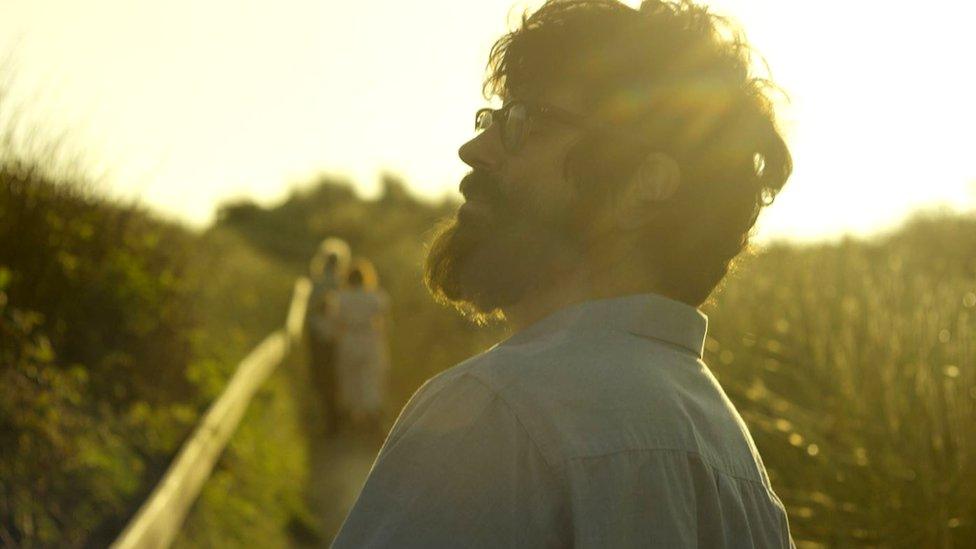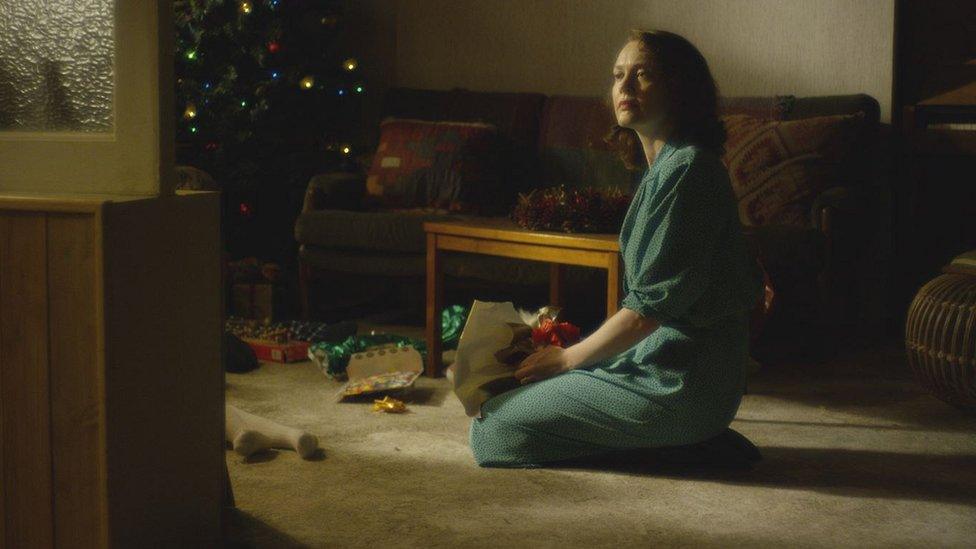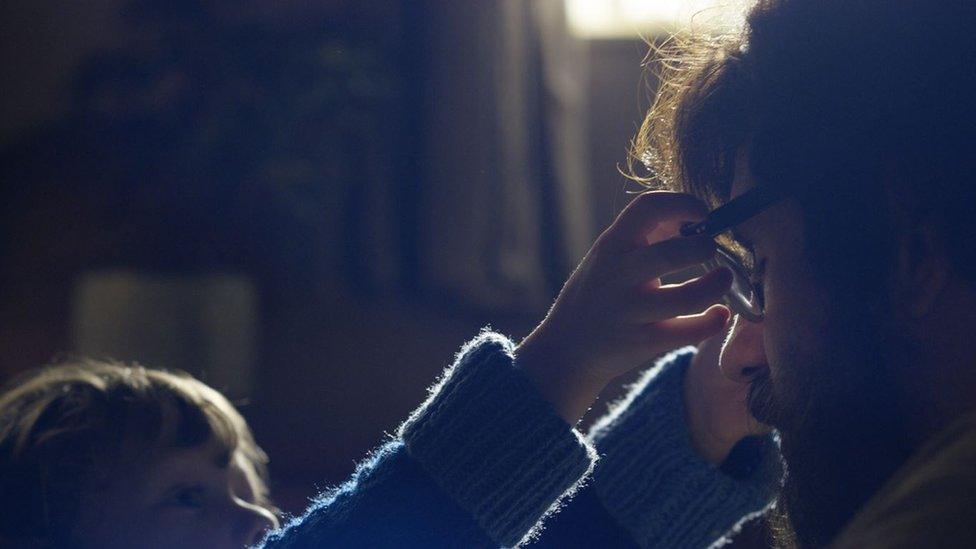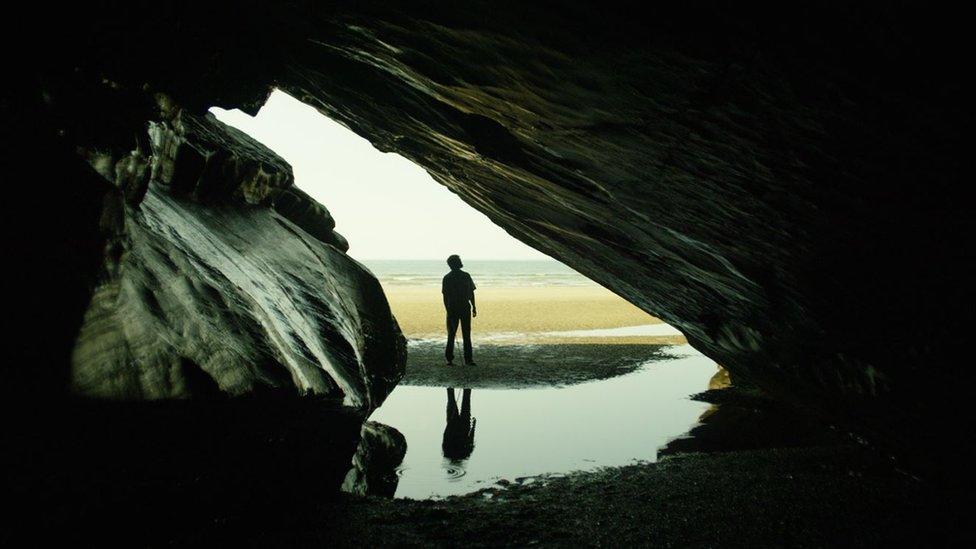Blindness film's 'beautiful and accessible' story
- Published

Notes on Blindness: The cinematography is often hazy and fragmented to immerse audiences in the experience of having no sight
In 1983, Birmingham-based academic John Hull began to lose his sight completely, after being told by doctors there was nothing they could do for him.
A married man in his 40s, with a family, he began to keep an audio diary documenting his journey "into a world beyond sight".
Touching the Rock: An Experience of Blindness, already the basis of an Emmy-winning short film, has now been used by British film-makers Peter Middleton and James Spinney to produce Notes on Blindness, which mixes authentic sound recordings of Hull and his wife, Marilyn, with their portrayal on the big screen by actors.
"I knew that if I didn't understand blindness, it would destroy me," Hull says in the film.

Simone Kirby, who plays John Hull's wife, Marilyn, says the film is "personal - it searches at the deepest levels"
An emeritus professor of religious education, originally from Australia, he worked on the film with Middleton and Spinney but died, aged 80, in July, a few months before its premiere at the Sundance Film Festival.
Spinney says: "John was an extraordinary man, and this is an unique testimony of someone really trying to understand blindness and to communicate that.
"He was really trying to comprehend what was happening to him.
"So we follow him from loss and despair into an insight into blindness and then even on to a sense of renewal and purpose."
Marilyn Hull calls the film "an extraordinary gift to our family, and perhaps especially to the grandchildren who will never have known him".
"We have made a couple of films together as a family," she says.
"But this is far more personal - it searches at the deepest levels."
Middleton, who first met Hull in 2010, says: "In his office in his home, he had shelves and shelves of boxes of audio-cassette tapes, as John had asked for many academic texts to be recorded when he realised that soon he would have no sight left at all."

"John felt long periods of deep despair of what was happening... for example, he only ever saw the faces of two of his four children," says film-maker Peter Middleton
"But there were also conversations on the tapes - John's family talking at important family events, audio letters between John and his parents in Australia, but also John himself, talking to himself, recording this diary and the impact of his condition on his relationships, dreams and memories.
"We made a short film about it, and then began to discuss a longer piece charting his full journey into blindness.
"But what was also interesting to us was the distance of 30 years since those reflections were recorded, it was a series of disembodied voices speaking from the past."
British actors Dan Renton Skinner and Simone Kirby lip-synch the words spoken by Hull and his wife.
The film also contains later real interviews with the couple.
And the cinematography is often hazy and fragmented to immerse audiences in the experience of blindness.
Spinney says: "We began to build on the idea of the dislocation of sound and image as the aesthetic for the film.
"All the central voices in the film would be authentic documentary audio, and everything on screen would be a visual interpretation of it.
"We also use John's memories of his dreams, where he is often seeing clearly."

John Hull began to "treat blindness like an adventure, appreciating his other senses", says film-maker Peter Middleton
The pain of Hull's experience is apparent from his voice in a scene from December 1984, the first Christmas he spent completely blind, where audiences can hear his voice trying to connect with his family as they open their presents.
Middleton says: "John felt long periods of deep despair of what was happening, and that is part of the process of the film.
"For example, he only ever saw the faces of two of his four children.
"Early on, we document his realisation that he is fast forgetting what his wife and children look like and just how distressing that is.
"He associates his blindness with defeat, but, astonishingly, slowly begins to turn his thinking around and treat blindness like an adventure, appreciating his other senses.
"As he says, 'I must not live in nostalgia, I must live in reality and become blind.'"
The film was praised as "a beautiful, accessible work of art" after its debut, but both Middleton and Spinney believe its virtual-reality companion piece, Into Darkness, is equally important - "because it's a chance for audiences to fully understand and immerse themselves in what a world without sight feels like".
"It's an important piece of our outreach programme, and also to build a conversation of how the partially sighted and the blind can continue to enjoy cinema," Spinney says.
Marilyn Hull says: "I know that John would have been immensely proud and pleased with this work.
"For me, it's been a rare opportunity to re-examine, through the filters of memory, time and love, a painful but utterly transformative part of my own life.
"John would have said to the film, 'Go well, with my blessing. I hope for some of the people who see it, there will be good and useful outcomes.'"
Notes on Blindness is released in the UK on 1 July.
Follow us on Twitter , on Instagram at , or email .